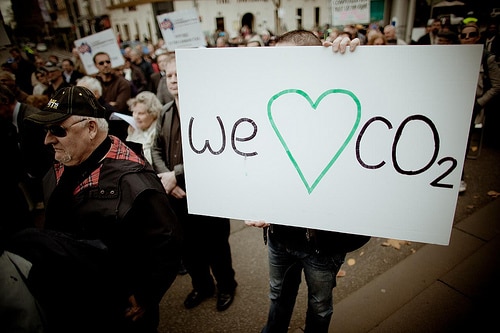THEY paid millions of dollars for adverts on television, in newspapers and online. They flew in climate change deniers from across the globe. They held rallies, engaged prominent right-wing media personalities, threatened scientists and turned the cold non-partisan findings of peer-reviewed science into some kind of blood sport.
But despite what was surely the dirtiest and most dishonest campaign ever waged before the Australian public, from next July major industrial emitters of greenhouse gases (about 500 of them) will have to pay $23 for every tonne of their pollution under laws passed earlier today.
The torrent of self-interest, archaic so-called “free-market” ideology and unmitigated greenhouse gas pollution, will give way to modest payments for the right to continue to pollute, while placing billions into funds to finance clean energy projects.
Away from the propaganda, the bare facts read like this. The laws now pass to the Senate for a vote in early November.
The previous Carbon Pollution Reduction Scheme legislation also got this far but was voted down twice in 2009 before it was deferred permanently by then Prime Minister Kevin Rudd.
This time though, the Greens who helped forge the bills which make up the Clean Energy Future package hold the balance of power in the upper house. Barring something extraordinary, which noone – not even the Opposition – is able to envisage, the laws will pass.
From 1 July 2012, Australia’s largest emitters of greenhouse gas emissions will have to pay a fixed price of $23 per tonne of pollution produced here. The price will rise to $25.40 per tonne in 2014/15. From 1 July 2015, an emissions trading scheme will be introduced where the government releases a fixed number of permits which major emitters will need to purchase through auctions. In the early stages, major industries will be given permits for free, but the assistance gets scaled back. The number of permits released by the government will be capped to enable Australia to cut its emissions by five per cent by 2020, based on 2000 levels.
Despite Prime Minister Julie Gillard promising in the run up to the 2010 Federal election that she wouldn’t introduce a price on carbon under “any government I lead”, a hung parliament left her no choice. The Greens and independents demanded the carbon price be put back on the agenda, in return for a deal that would keep Gillard in power.
Labor and the Greens say the carbon price will open the floodgates for investment in renewable energy. Renewable energy advocates Beyond Zero Emissions have claimed that unless the price gets close to $100 per tonne, then Australia will merely shift from brining coal to another fossil fuel – gas.
And while Australia acts on emissions produced on its own territory, it continues to cement its position as the world’s biggest exporter of coal.
But what of that anti-tax campaign? The one which failed?
Earlier today, Greens Senator Christine Milne told me
Pic credit: Flickr/mugfaker
Subscribe to our newsletter
Stay up to date with DeSmog news and alerts







